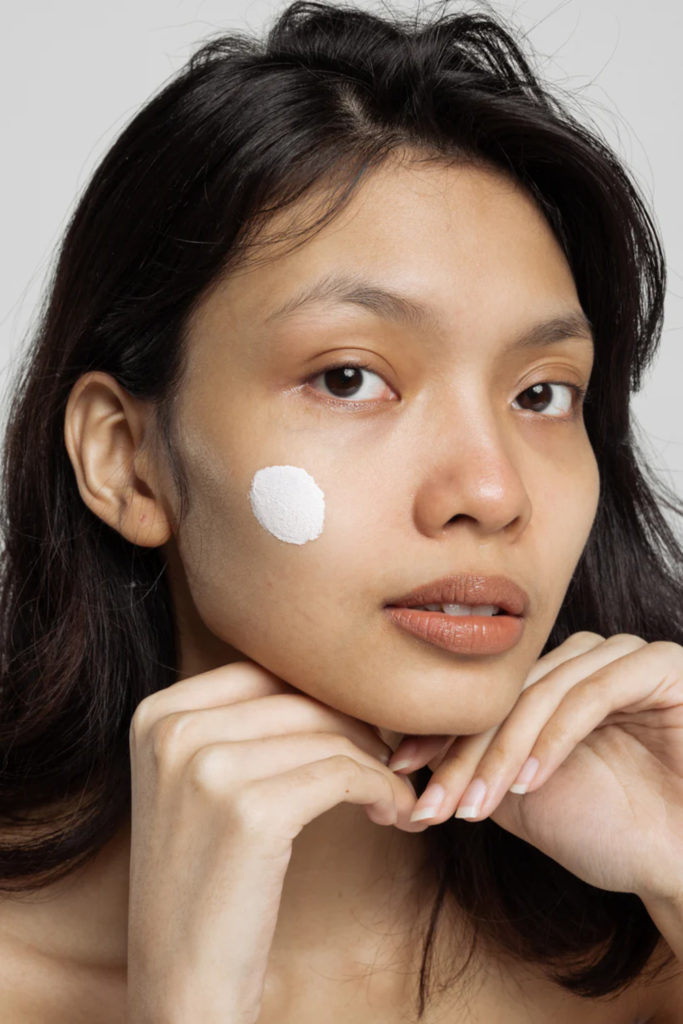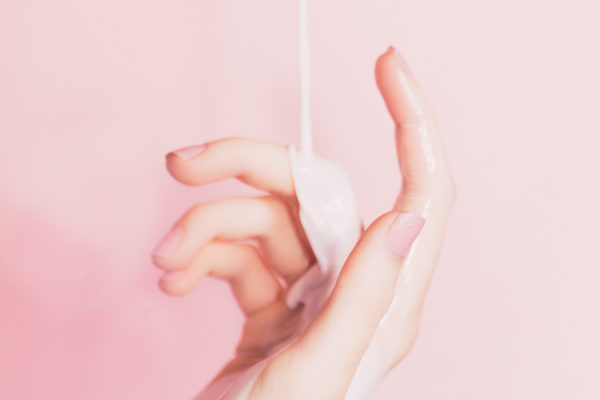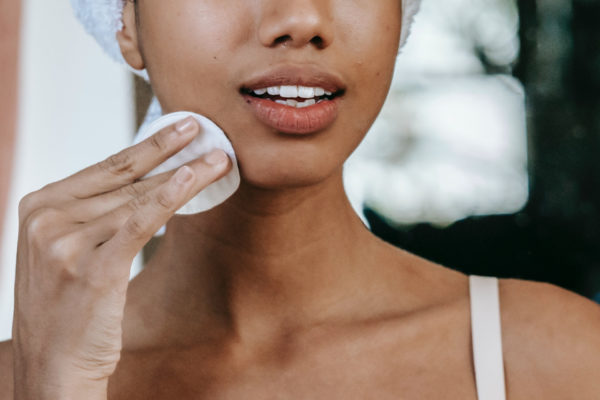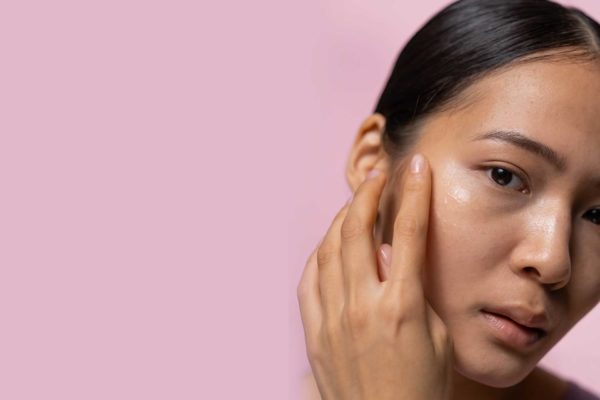How To Incorporate Hyaluronic Acid Into Your Skin Routine
By
2 years ago
Meet the ultimate hydration booster

Hyaluronic acid is one of the biggest ingredients in skincare right now, praised for its ability to nourish and hydrate skin. But how much do you really now about this moisture-retaining powerhouse? We ask the experts just how hyaluronic acid works in the beauty space – and how we can best unlock its benefits.
The Country & Town House Responsible Buyers’ Guide
What Is Hyaluronic Acid?
‘Hyaluronic acid (HA) is a sugar molecule that is naturally found in our bodies, from our skin to our eyes and our joints,’ says Dr Deepa Panch, an NHS surgical and aesthetic doctor. ‘In fact, 50 percent of the HA in our body is found specifically in the skin.
‘HA is known as a humectant, which simply means that it retains moisture,’ she continues. ‘HA is known to attract a thousand times its weight in water so you can imagine what that means for the skin, which is the largest organ in the body – an abundance of hyaluronic acid translates to well-hydrated skin, which is plump and dewy.’
‘Hyaluronic acid is a true powerhouse ingredient,’ adds Terry de Gunzberg, founder of ByTerry. ‘It acts like a moisture magnet, drawing in water and locking it into your skin, ensuring it stays deeply hydrated, supple and radiant.’
Is HA Good For Skin?
In short, yes, hyaluronic acid is great for skin – especially as we get older. ‘As we age, we lose hyaluronic acid in our skin, thus we lose the ability to draw in moisture,’ says Dr Panch. ‘This can lead to dull, dehydrated skin which can look crepy, and can exacerbate concerns such as rosacea or eczema. Compounded with changes to hormones, particularly during the menopause, a loss of hyaluronic acid can make the skin seem very dry.’
‘Sometimes, the word “acid” can be intimidating, especially for those with dry or sensitive skin,’ adds Terry. ‘However, hyaluronic acid doesn’t strip or irritate the skin to the extent some other acids might, as it’s a humectant, not an exfoliant.’
Do Certain Skin Types Benefit More From Using HA?
The dryer your skin, the more you’re going to benefit from regularly using hyaluronic acid, says Dr Panch. ‘Hyaluronic acid is great for all skin types, but it’s particularly useful for those who have noticed dull, dehydrated and dry skin.’
But that doesn’t mean you shouldn’t be using it if you lean towards a more oil complexion. ‘Hyaluronic acid is a universal hydrator, benefiting all skin types,’ explains Terry. ‘Whether your skin leans towards oily, dry or somewhere in between, it helps balance moisture levels, promoting that healthy glow we all crave. For those with dry or mature skin, the hydrating properties of hyaluronic acid are especially beneficial, and for those with oily or acne-prone skin (contrary to what some might think) it can actually help regulate skin’s oil production. When skin is well-hydrated it produces less oil, which is essential for managing oily skin and preventing breakouts.’

(c) Fleur Kaan, Unsplash
Hyaluronic Acid In Skincare
What Are The Benefits?
‘Topical hyaluronic acid can be used within a skincare regime to add moisture, which can help keep skin hydrated, improve the appearance of fine lines and wrinkles and help give the skin a more youthful appearance,’ lists Dr Panch. ‘As it is something we naturally have in our skin, HA in skincare products tends to be very well tolerated, infrequently causing allergies or side effects, thus making it suitable for everyone, particularly those with sensitive skin. It is also safe to use during periods of pregnancy and breastfeeding, which many active skincare ingredients aren’t.’
When Should You Start Incorporating HA Into Your Skincare Routine?
It’s recommended that we start reviewing our skincare routine around our late 20s and early 30s, as this is when we start to notice more visible changes to our skin. ‘This is a great time to introduce an hyaluronic acid as we know we start to lose our natural HA at this point,’ says Dr Panch. ‘However, it is never too late to incorporate great ingredients into your routine, so please don’t feel like you have missed the boat by starting later.’
Which Step Should HA Come In Your Skincare Routine?
For those with a multi-step skincare routine, Dr Panch recommends using HA products after cleansing and before moisturising: ‘My preference is for HA in a serum, which can be applied to damp skin once it has been cleansed. Applying it to damp skin will also help with its absorption.’
Hyaluronic Acid In Makeup
What Are The Benefits?
‘As with skincare, incorporating hyaluronic acid in makeup infuses your routine with hydration,’ says Terry. ‘In skincare, it revitalises the skin, minimises the appearance of fine lines and wrinkles, and balances oil production. When infused in makeup, it provides a smooth canvas for application and ensures that products sit beautifully on the skin, preventing them from settling into fine lines and creases – promoting a more even and long-lasting look with a radiant finish.’
Is The Efficacy Of HA Impacted When Mixed Into Makeup, Compared To Skincare?
‘Not at all, hyaluronic acid is a game-changer in makeup,’ emphasises Terry, who has crafted an entire HA range that focuses on hydrating makeup products. ‘I truly love the non-cakey finish that hyaluronic acid-infused products offer – and considering that our skin naturally loses moisture and elasticity as we age, infusing the hydrating benefits of hyaluronic acid into every step of your routine is an approach that not only helps to combat these effects, but also imparts a subtle, natural glow to the skin.’

(c) Getty Images
Using Hyaluronic Acid
Should You Use HA Everyday? Can You Overuse It?
‘While hyaluronic acid can be used as often as you like, I normally suggest my patients try and use it once a day – morning or evening – within their skincare routine,’ advises Dr Panch. ‘There have been some reports of irritation caused by overuse of HA, where people have been using it in multiple products multiple times a day, so I don’t recommend using it more than once a day. As with everything in life, moderation is key.’
Sodium Hyaluronate vs Hyaluronic Acid
If you religiously check the ingredients list on the back of your beauty products, you might have noticed the term ‘sodium hyaluronate’ pop up in the same space as hyaluronic acid. There’s been a little confusion about whether the two ingredients are the same thing, so we asked our experts to explain the differences: ‘Sodium hyaluronate and hyaluronic acid are terms that can sometimes be used interchangeably, but sodium hyaluronate is actually a salt which is extracted from HA,’ clarifies Dr Panch. ‘It has very similar properties to HA, however it has a much smaller molecular weight, which means that it can penetrate into deeper layers of the skin. It is also much more stable, meaning it has a longer shelf life than HA.’
Which Product Type Is More Effective When It comes To HA?
There are a whole load of HA products on the market these days, spanning from serums, sprays and mists to moisturisers and injectables – but some methods of using hyaluronic acid are better than others, says Dr Panch: ‘The most effective way of adding HA into the skin is injected, using a skin booster like Profhilo. Topically, the best way is a serum, as the molecules of HA within serums tends to be much smaller, and so they can penetrate deeper layers of the skin. This is ideally applied onto damp skin so that it is better absorbed.’
Hyaluronic Acid Skincare To Try Now
Featured image: Jernej Graj, Unsplash














